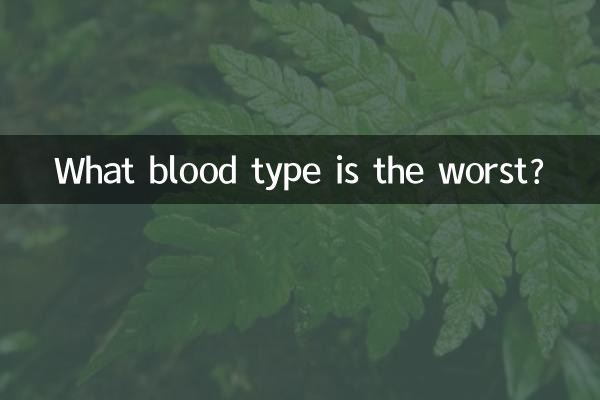What blood type is the worst? Uncovering the potential link between blood type and health
In recent years, the relationship between blood type and health, personality, and even destiny has been a hot topic on the Internet. In particular, the discussion of "which blood type is the worst" has attracted widespread attention. This article will combine the hot topics and hot content on the Internet in the past 10 days, and explore the potential relationship between blood type and health through structured data analysis.
1. Popular discussions on blood type and disease risk

According to recent popular content on social media and health forums, many netizens believe that type O blood is the most "bad" blood type because people with type O blood are more likely to suffer from certain diseases. However, is this view scientific? We have compiled recent research data and online discussions, as shown in the following table:
| blood type | Highly prevalent diseases (hotly discussed on the Internet) | Scientific basis (recent research) |
|---|---|---|
| O type | Gastric ulcer, duodenal ulcer | Research shows people with type O blood have higher gastric acid secretion |
| Type A | cardiovascular disease, cancer | Type A blood cholesterol levels may be higher |
| Type B | diabetes, pancreatitis | Some studies suggest that type B blood is associated with metabolic diseases |
| AB type | memory loss, blood clots | Type AB blood clotting factors may be more active |
2. Internet myths about blood type and personality
In addition to health risks, the relationship between blood type and personality has also been a hot topic on the Internet recently. Many netizens judge different blood types based on the so-called "blood type personality science":
| blood type | Negative comments online | scientific opinion |
|---|---|---|
| O type | Stubborn, impulsive | Not supported by scientific evidence |
| Type A | anxiety, perfectionism | May be related to stress response |
| Type B | selfish, undisciplined | Pure stereotype |
| AB type | contradictory, elusive | lack of research support |
3. The advantages and disadvantages of blood types from a scientific perspective
From a scientific perspective, there is no "worst" blood type. Each blood type has its own unique strengths and potential weaknesses:
| blood type | Potential advantages | Potential risks |
|---|---|---|
| O type | Strong anti-malarial ability | Slightly higher risk of stomach problems |
| Type A | Strong resistance to certain infectious diseases | Slightly higher risk of cardiovascular disease |
| Type B | Digestive system adaptable | Slightly higher risk of pancreatic disease |
| AB type | Immune system is highly flexible | Slightly higher risk of blood clots |
4. Five blood type rumors that have been hotly discussed on the Internet recently
When sorting out hot topics in the past 10 days, we found that the following rumors about blood types are the most widely spread:
1. “Type O blood is most likely to attract mosquitoes” - there is no conclusive scientific evidence yet
2. “Type A blood is more likely to be infected with the new coronavirus” - research results are inconsistent
3. "People with type B blood have lower IQs" - completely without scientific basis
4. “AB blood type is a universal recipient” - This is an outdated misconception
5. "A certain blood type is destined to have a short life" - life span is affected by multiple factors
5. Expert opinions and suggestions
Medical experts emphasized in recent interviews that blood type is only a part of genetic characteristics. Instead of paying too much attention to the "good or bad" of blood type, it is better to pay attention to a healthy lifestyle:
1. Regular physical examination is more important than blood type
2. A balanced diet and moderate exercise are key
3. Avoid psychological implications due to blood type
4. Blood type matching is the key during blood transfusion.
Conclusion: Blood types are not absolutely good or bad. Instead of worrying about "which blood type is the worst", it is better to focus on scientific health care. Many blood type theories on the Internet lack scientific basis. Readers should maintain rational judgment and not be misled by one-sided information.

check the details

check the details